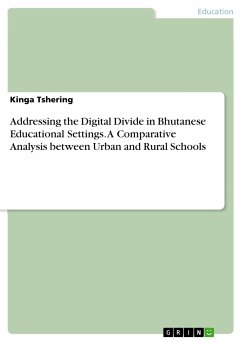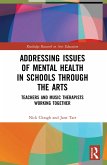Document from the year 2023 in the subject Didactics - E-Learning, grade: 1,3, , course: Educational Technology, language: English, abstract: The article delves into the existing digital divide in Bhutan's educational scenario, specifically examining and evaluating the digital divide between urban and rural schools. Although the government has initiated various policies incorporating technology into education, the digital gap persists, obstructing equitable access to learning resources in rural and urban parts of Bhutan. The article specifies socio-economic factors, feasibility challenges, and gaps in training as factors that led to the digital divide. The article also identifies the importance of political initiatives in development of infrastructures and policy decisions, focusing on comprehensive and inclusive governmental policies for both rural and urban settings. The article recommends citizenship actions to curb the issues of the digital divide, including more budget allocation, subsidized internet services and charges, digital literacy programs, and teacher and student professional development, especially in rural settings. However, issues such as increased budget approval, implementation of policy, infrastructural limitations, and diverse linguistic settings in rural areas still remain challenges. Solving the digital gap is of paramount importance for Bhutan's overall socio-economic development, increasing educational and employment opportunities, and facilitating innovation in both urban and rural communities. The article suggests collaborative actions from stakeholders for digitally inclusive Bhutan and highlights recommendations for policymakers, educators, and communities.
Dieser Download kann aus rechtlichen Gründen nur mit Rechnungsadresse in A, B, BG, CY, CZ, D, DK, EW, E, FIN, F, GR, HR, H, IRL, I, LT, L, LR, M, NL, PL, P, R, S, SLO, SK ausgeliefert werden.









